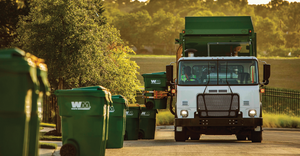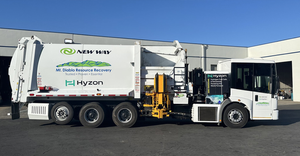NWRA to Build Upon its Advocacy Work
The association is growing its government affairs team at the state and federal levels, so it can continue to be the voice of the industry.
The National Waste & Recycling Association (NWRA) unveiled its 2019 Federal Legislative and Regulatory Agenda in January, which stakes out the waste and recycling industry’s policy positions on three dozen federal issues. And in an effort to back those policies and continue to be the voice of the industry, NWRA is growing its government affairs team on the state and federal levels, most recently adding Jim Riley to its staff as vice president of federal affairs and deputy counsel, Teddy Greissing and Jonathan Taylor as government relations managers and Abby Blocker as vice president of state affairs.
Riley is helping NWRA expand its Washington, D.C., footprint by solidifying its relationships on Capitol Hill, within the regulatory agencies and among other Washington, D.C.-based entities. In addition, he is working to implement a number of strategies that will make the industry stronger and better recognized by lawmakers and other influential parties, according to Darrell Smith, president and CEO of NWRA.
“NWRA is a great organization,” said Riley in a statement. “There aren’t many industries like waste and recycling that impact everyone in America every day. I look forward to working with lawmakers and regulators to ensure that our industry can grow and thrive.”
Greissing and Taylor are assisting in the Washington, D.C., office while being trained to eventually help with chapter operations. And Blocker is working to identify trends impacting the waste and recycling industry across various states and steer policy in a favorable direction, as well as take over the Sunbelt Region's events and chapter meetings, grow new chapters and enhance her knowledge of the waste and recycling industry.
“I believe waste and recycling is an undervalued issue that more people should talk about,” says Blocker. “I’m excited to join NWRA’s prestigious team advocating for our members in the waste and recycling industry, and I look forward to helping advance NWRA’s legislative and educational efforts on the state level.”
Blocker’s first task in her new role will be to grow the Sunbelt Region chapters (Alabama, Arizona, Colorado, Florida, Georgia, New Mexico, North Carolina, Oklahoma, South Carolina and Texas), which are currently small in size, and lead upcoming events and meetings. In addition, she will help grow the Rocky Mountain Chapter, which was formed last year and is also currently small in size.
“It has been quite a challenge so far because we had to reschedule our first golf event in the Rocky Mountain area due to rain,” states Blocker. “The chapter is pretty barebones right now, but I would like to grow that chapter, along with others, over the next year or two.”
Over the next couple of months, she also plans on meeting with the regional directors of NWRA’s chapters to go over key issues and identify the main policies of interest. From there, she will create an overall report that includes information from all the chapters to present to NWRA’s board.
“Our chapters comprise members, and those members can form what we call a Legislative Committee,” explains Blocker. “Each chapter has a Legislative Committee, so I plan to meet with them to find out what they want to focus on. While I will be the face of the Sunbelt Region chapters starting out, I want to be known as NWRA’s state affairs lead for all chapters in the future.”
According to Brandon Wright, vice president of communications and media relations for NWRA, the association has strong chapter operations and that’s where a lot of the policy efforts start.
While NWRA has a strong focus on safety advocacy, it’s also honing in on recycled materials, energy generation, food waste, interstate waste restrictions, privatization of waste and recycling services, import/export of waste and recycling materials, China’s recyclable materials import standards and ban, surface transportation infrastructure, water infrastructure, railways, autonomous vehicles, landfill methane emissions regulations, Waters of the United States rule/Clean Water Act, coal ash, tax extenders, tax corrections legislation, federal excise tax repeal, tort reform, Occupational Safety and Health Administration reporting requirements, regulatory accountability, improved federal permitting process, sue and settle, reasonable opportunity to comply, driver shortage and workforce development, apprenticeships, association health plans, immigration, U.S. Department of Labor overtime rules, U.S. Department of Labor persuader rules and National Labor Relations Board joint-employer ruling.
“Last year, NWRA’s Government Affairs Committee approved 36 policy positions on the most pressing federal issues impacting the waste and recycling industry. We have updated these positions for 2019 to reflect changes in congressional priorities as well as our successes from 2018,” said Smith in a statement. “We will continue our aggressive lobbying effort in support of these policies aimed at maintaining a strong and robust waste and recycling industry that benefits the American public.”
As we push further into 2019 and beyond, Riley and Blocker, along with other government affairs team members, will push NWRA’s advocacy efforts forward and continue to make adjustments and additions where needed.
NWRA will hold its 2019 Executive Leadership Public Policy Conference in September in Washington, D.C., where it will have conversations around industry issues and what can be done to address those issues.
Waste360 will continue to track NWRA’s actions and provide updates as advocacy efforts advance.
About the Author
You May Also Like




